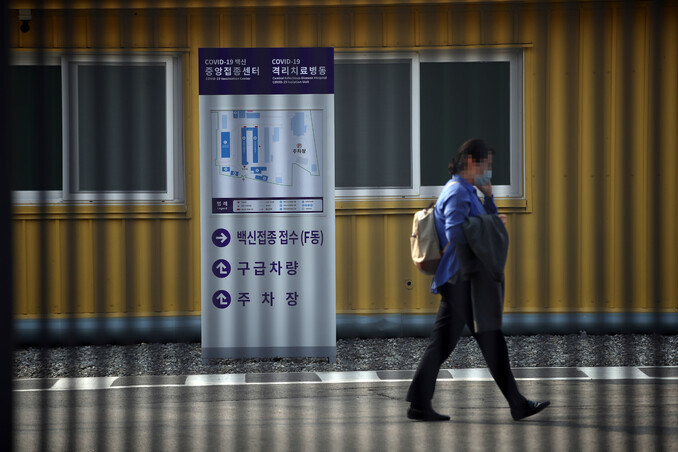hankyoreh
Links to other country sites 다른 나라 사이트 링크
S. Korea reports 182 cases of COVID-19 variants since December

The response to COVID-19 variants is being seen as a key factor determining whether South Korea heads into a fourth wave of infections, amid a growing number of community infections involving strains that are more highly transmissible than past ones.
Experts stressed the need to speed up the administration of vaccines before the variants become the predominant strains in South Korea.
A total of 182 patients to date have been diagnosed with virus variants since the first case in South Korea was reported in December 2020. Ten community infection clusters so far have been associated with variants, including five recent clusters at a Busan funeral home, an Ulsan driving range, a food company in Gwangju, Gyeonggi Province, and other locations.
The first confirmed cases involving a variant originating in South Africa were detected in a cluster infection involving a family in Gimpo, Gyeonggi Province.
“The virus variants have all been discovered in different regions, such as Gyeonggi Province, Incheon and Busan,” noted Kim Woo-joo, a professor of infectious disease at Korea University Guro Hospital.
“We should anticipate that the cases that have been found so far are just the tip of the iceberg, and that [the variants] have already spread within the greater Seoul and Busan regions,” he added, predicting that the “spread of virus variants in the local community will be the tipping point toward a fourth wave.”
With more and more cases of variant-associated cluster infections with no identifiable transmission route, disease control authorities are worried about a situation where the variants increasingly become the predominant strains. This could spell trouble for the plans to establish “herd immunity” by November through the vaccination of 70 percent of the South Korean population.
Not only do the virus variants reduce the rate of antibody formation needed for herd immunity, but their high transmissibility could lead to a situation where more people need to be vaccinated for herd immunity to be established.
In addition to being more transmissible than previous strains, most analyses have shown the virus variants are less responsive to the currently developed vaccines. Research findings have shown the AstraZeneca vaccine to have a prevention effect of just 10% for the South African variant, while others have shown the efficacy of the Moderna and Pfizer vaccines to be 12.4 times lower and 10.3 times lower, respectively.
But experts have been stressing the need to proceed swiftly with vaccinations before the variants have the chance to spread.
“Once the variants have become predominant, we will need to re-administer vaccines that are effective against them, and it’s easier to respond to revaccination when we have a majority of people with a history of previous vaccination,” said Choi Won-seok, a professor of infectious disease at Korea University Ansan Hospital.
The reasoning is that while just one additional shot would suffice for those previously vaccinated, unvaccinated people would need to be inoculated twice.
In the end, the key difference will be whether vaccine administration can be sped up while maximum efforts are made to contain the variants’ spread. In a March 9 briefing, disease control authorities announced plans to pursue the acquisition of effective vaccines in response to the variants, while using large-scale next-generation genetic testing to step up efforts to detect the variants.
A total of 446 new COVID-19 cases were confirmed Monday by the end of the day.
By Suh Hye-mi, staff reporter
Please direct comments or questions to [english@hani.co.kr]

Editorial・opinion
![[Column] Season 2 of special prosecutor probe may be coming to Korea soon [Column] Season 2 of special prosecutor probe may be coming to Korea soon](https://flexible.img.hani.co.kr/flexible/normal/500/300/imgdb/original/2024/0426/3317141030699447.jpg) [Column] Season 2 of special prosecutor probe may be coming to Korea soon
[Column] Season 2 of special prosecutor probe may be coming to Korea soon![[Column] Park Geun-hye déjà vu in Yoon Suk-yeol [Column] Park Geun-hye déjà vu in Yoon Suk-yeol](https://flexible.img.hani.co.kr/flexible/normal/500/300/imgdb/original/2024/0424/651713945113788.jpg) [Column] Park Geun-hye déjà vu in Yoon Suk-yeol
[Column] Park Geun-hye déjà vu in Yoon Suk-yeol- [Editorial] New weight of N. Korea’s nuclear threats makes dialogue all the more urgent
- [Guest essay] The real reason Korea’s new right wants to dub Rhee a founding father
- [Column] ‘Choson’: Is it time we start referring to N. Korea in its own terms?
- [Editorial] Japan’s rewriting of history with Korea has gone too far
- [Column] The president’s questionable capacity for dialogue
- [Column] Are chaebol firms just pizza pies for families to divvy up as they please?
- [Column] Has Korea, too, crossed the Rubicon on China?
- [Correspondent’s column] In Japan’s alliance with US, echoes of its past alliances with UK
Most viewed articles
- 1After election rout, Yoon’s left with 3 choices for dealing with the opposition
- 2AI is catching up with humans at a ‘shocking’ rate
- 3Noting shared ‘values,’ Korea hints at passport-free travel with Japan
- 4Two factors that’ll decide if Korea’s economy keeps on its upward trend
- 5Why Kim Jong-un is scrapping the term ‘Day of the Sun’ and toning down fanfare for predecessors
- 6South Korea officially an aged society just 17 years after becoming aging society
- 7Korea’s 1.3% growth in Q1 signals ‘textbook’ return to growth, says government
- 8Is Japan about to snatch control of Line messenger from Korea’s Naver?
- 91 in 5 unwed Korean women want child-free life, study shows
- 10[Reportage] On US campuses, student risk arrest as they call for divestment from Israel